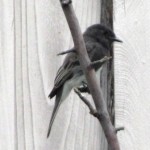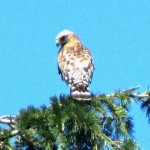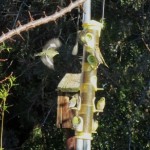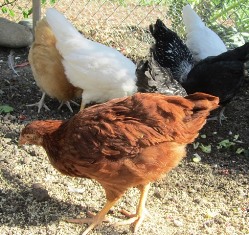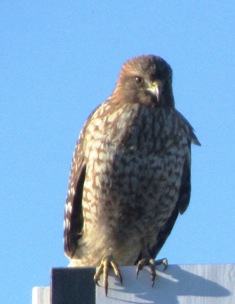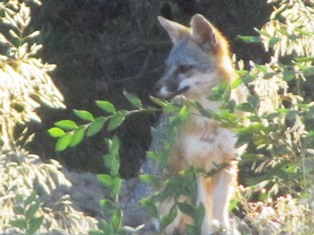How to Attract Birds to Make Your Garden a Sanctuary
A Chinese proverb states that “If I keep a green bough in my heart, then the singing bird will come.” I think I was born with that green bough in my heart because I have always loved birds–and not only the songbirds.
By offering food, water, and safe and dry housing as well as blooms for every season (flowering annuals, perennials, herbs, bulbs, and fruits and berries), I am able to attract many different birds into my garden.When birds are present, especially the songbirds, the garden becomes a special sanctuary.
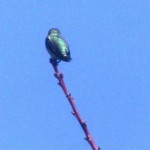
A hummer’s iridescent feathers shimmer as it perches in sunlight at the end of an apricot tree branch
I hang feeders and fill them with various types of seed and suet cakes as well as syrup for hummingbirds. Food attracts local and migratory birds flying through this time of year. It’s best to choose a wide sampling of foods such as seeds, nuts,hulled sunflower, safflower, Nyjer thistle, peanut, millet, fruit, berries, raisins, and meal worms to draw interesting bird traffic.
Some of the birds we regularly see include scrub jays, wrens, finches, sparrows, red-tail hawks, mockingbirds, quail, mourning doves, robins, barn owls, hummingbirds, and crows.
With food scarce in the wild, the birds visit the hanging and platform feeders. For ground feeders like mourning doves, I put out a large saucer under the apple tree and, yes, I leave a few apples on the tree for the birds to peck. For a list of birds and the types of seed and other foods they consume, see, https://www.wild-bird-watching.com/Bird_Seed.html
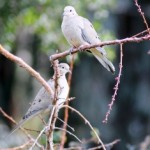
Mourning doves mate for life; these two are joined at the feeder by a third who has lost his or her partner
Some of our winged visitors stick around to mate and build nests in climbing rose bushes, brush piles, trees, or one of the many birdhouses we’ve hung. Only the owl basket high in the pepper tree remains empty, but we’ve heard a lot of hooting at night so we’re optimistic that owls will take up residence here. We live close to designated agricultural lands and the empty field behind us has a lot of mice–their favorite food.
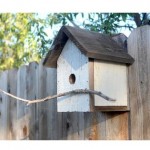
My hubby built this birdhouse from a fence board. Not all birds will take up residence in a house, but many will.
Birds build nests in backyard birdhouses and brush piles as well as in trees, shrubs like climbing roses, and under the protected eaves of buildings (mourning doves especially seem to like these). Hummingbirds will build their tiny cup-like nests in shrubs (we found one in our Cecil Brunner climbing rose bush) and trees, from 10 feet and up in locations where wind isn’t a threat.
A water source is important for attracting birds since they both drink and bathe in the water fountains and bird baths of backyards and gardens.
If you provide food, water, and a safe and dry shelter for the birds to eat, breed, and nest, you will be rewarded for not only the singing birds will come but other interesting species as well.
_______________________________________________________
If you enjoy reading about living close to the earth and a good yarn, check out my Henny Penny Farmette series of cozy mysteries: A BEELINE TO MURDER, THE MURDER OF A QUEEN BEE, and my latest, A HIVE OF HOMICIDES.
These mysteries are chock-full of tips for keeping chickens and bees, growing heirloom fruits and vegetables, and backyard DIY projects. For more information, click on the URL.
A HIVE OF HOMICIDES
What’s Eating the Chicken Eggs?
Several times over the last month or so, I’ve traipsed to the hen house to collect eggs and found a broken egg or one with a hole in the shell and the egg otherwise intact.
I wondered if one of the chickens had gone rogue and was pecking the egg that either she or one of the other hens had laid.
My flock is small and they usually lay their eggs during the morning hours, using the afternoon to free range and forage.
Each time I heard a cackle, I sprinted to the chicken house to see who was raising the ruckus and whether or not she’d pecked her egg.
Finally, I caught one of my Silver-Lace Wyandotte hens on the nest. With her head twisted behind and under her wing, I could not tell what was going on. I slipped my hand under her, causing her head to jerk around. It appeared I had caught her in the act as her beak was covered with yolk.
So I thought I’d solved the mystery. My solution was to remove each egg as soon as the hen laid it. If I removed the eggs, any temptation for the chickens to peck the eggs would be eliminated, too. But running for every chicken squawk became so time consuming, I finally stopped.
To my utter surprise, there were no more broken eggs. That didn’t make sense. However, during the whole ordeal with the broken eggs, I’d been smelling a skunk. When my closest neighbor said a skunk had been raiding his coop for the eggs, I began to think I had wrongly accused my poor Wyandotte.
Indeed, since my neighbor took care of the skunk (by trap, I believe), my hens are producing eggs every day and none have holes or are cracked. I’m now thinking the skunk was the egg robber.
That experience got me thinking about other predators that will eat chicken eggs (and chickens, too). The list includes opossums, weasels, rats, snakes, minks, foxes, wild dogs, coyotes, raccoons, hawks, and owls. So, even if I’ve got a nice hen house and a run with a wire roof, it seems that a predator motivated by a good meal with find a way in.
 Facebook
Facebook Goodreads
Goodreads LinkedIn
LinkedIn Meera Lester
Meera Lester Twitter
Twitter




